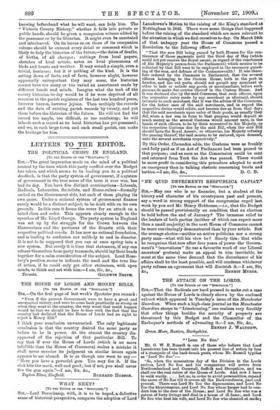WHAT NEXT ?
[To THE EDITOR or THE "SPECTATOR.") SIR,—Lord Beauchamp, with, it is to be hoped, a defective sense of historical perspective, compares the adoption of Lord Lansdowne's Motion to the raising of the King's standard at Nottingham in 1642. There were some things that happened before the raising of the standard -which are more relevant to the situation in which we find ourselves to-day. On March 24th of that unhappy year the House of Commons passed a, Resolution to the followng effect:- " That the new Bill being passed by both Houses for the con- tinuance of those payments until the third day of May (which could not yet receive the Royal assent, in regard of the remoteness of His Majesty's person from the Parliament) which monies to be collected by that Bill were to be employed in the necessary guard- ing of the seas, and defence of the Commonwealth ! It was there- fore ordered by the Commons in Parliament, that the several officers belonging to the Custom House, both in the port in London, and the out ports, should not permit any merchant or other to lade or unlade any goods or merchandises, before such persons do make due entries thereof in the Custom House. And it was declared also by the said Commons, that such officers, upon the respective entry made by any merchant as aforesaid, should intimate to such merchant, that it was the advice of the Commons, for the better ease of the said merchants, and in regard the respective duties would relate, and become due as from that day; that the said merchants upon entry of their goods, as usually they did, when a law was in force to that purpose, would deposit so much money as the several Customs would amount unto, in the hands of such officers, to be by them accounted to his Majesty, as the respective Customs due by the said Bill, when the said Bill should have the Royal Assent; or otherwise, his Majesty refusing the passing thereof, the said monies to be restored, upon demand, unto the several merchants respectively."
By this Order, Clarendon adds, the Customs were as frankly and fully paid as if an Act of Parliament had been passed to that purpose; and as soon as the Commission could be sent and returned from York the Act was passed. There would be more profit in considering this procedure adopted to meet an emergency than in talking rhetoric concerning broils and














































 Previous page
Previous page